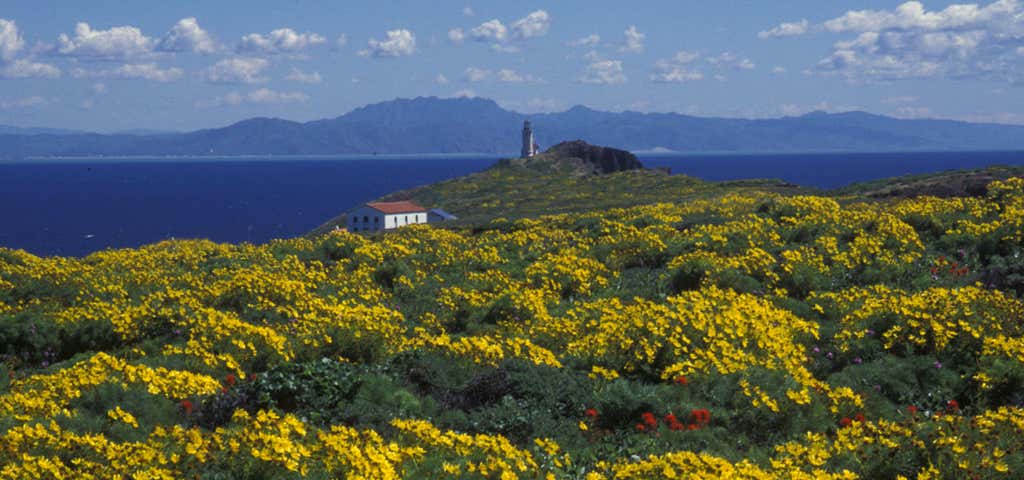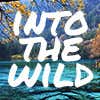Hidden a few miles offshore in Southern California, Channel Islands National Park may not be the easiest to get to, but if you're willing to get a boat out there, it's well worth the effort. White sand beaches, secluded sea caves, breathtaking coastal cliff views, mesmerizing shipwrecks, fossils and archaeological gems, and wonderful wildlife are all just waiting to be discovered on the six islands that comprise the park. Each island has its own distinct flavor and personality-- if you can, visit them all! Here's our guide to each of the Channel Islands in the park.
To get you started, there are two mainland visitor centers. The Robert J. Lagomarsino Visitor Center at Channel Islands National Park in Ventura offers the bookstore, museum, film screening, and info you need to visit the islands, and there's also the smaller Outdoors Santa Barbara Visitor Center, which offers some info and a great view of the water and the city. You'll also find visitor centers on Santa Barbara and Anacapa Islands and at Scorpion Ranch on Santa Cruz Island. The Ventura Visitor Center is also near where the year-round boat concessionaire, Island Packers, is located. Catching an Island Packers ferry is one of the best ways to reach the islands. You can also kayak, hire a private boat, or, in the case of San Miguel and Santa Rosa, catch a private plane to the islands.
Santa Cruz Island
This is the largest of the channel islands, at 22 miles long, and it's the easiest to reach. It's home to some really epic sea caves, which bootleggers used to store hooch during Prohibition. In fact, the island is home to one of the world's largest sea caves, the Painted Cave. It's a quarter mile long, 100 feet wide, and the entrance is 160 feet tall. In the spring, the opening is covered by a refreshing waterfall! Back on dry land, you'll find evidence of the thousands years of human contect with the island, from Native Americans to pioneers who used the island for ranching, growing grapes, and more.
There's a visitor center at historic Scorpion Ranch, and nearby at Scorpion Anchorage, the Channel Islands Adventure Company offers guided kayak tours, snorkel equipment rentals, and sells a few convenience items. Cavern Point Loop and Scorpion Canyon Loop are two scenic hikes on the island.
Like most of the other Channel Islands, San Miguel was settled by early Native Americans, and later was used for ranching, but unlike the other islands, the US Navy used it for a bombing range. It's more exposed to the elements than the other islands, so it's harder to reach, and it's extra windy and foggy, but there are still primitive campsites. The waters are this island are especially notorious for being full of great white sharks as well, so be careful, and don't go kayaking unless you're really comfortable on the water!
You need a permit to visit San Miguel, which you can obtain from the boat or plane concessionaire, and facilities are limited. Kayaking, swimming, and snorkeling aren't suggested due to the rough waters. Cuyler Harbor is the only beach open to visitors, but it's an absolute stunner.
Santa Rosa Island
This is the second-largest of the islands, and it has one of the most diverse landscapes. There's camping, kayaking, and hiking a-plenty (and it's prime whale-watching and great white shark-spotting territory as well) but I have to say... it's got some of the prettiest beaches of all the Channel Islands. Whether you take a boat out, or charter a plane, it's definitely great for an overnight stay-- it'll give you plenty of time to explore the forests, canyons, and mountains, and take a bit of time for relaxing on the white sand beaches!
Strong winds make swimming, kayaking, and snorkeling less fun here, but there are some good spots for surfing, primitive campsites, and plenty of hiking. Trails include the Water Canyon Beach Trail to the island's best beach, the Lobo Canyon Trail and the Torrey Pines Trail.
This is the only island to not have a Spanish name; "Anacapa" comes from the Chumash word for "mirage island". It's definitely a little more rocky and windswept than the others-- which might explain why the Winfield Scott, a sidewheel steamer, crashed into the island at full speed. Fortunately, everyone survived the wreck and was rescued, but allegedly, rats from the ship also managed to survive the crash and make it onto the island, where they wreaked havoc on the natural habitat for over 100 years, before the Parks Service managed to clear them out. Ew. On a more pleasant note, one of the island's coolest features is a 40-foot natural bridge called Arch Rock-- imagine kayaking through it! It also has a picturesque lighthouse on the Eastern part of the island-- it was the last one built by the US Lighthouse Service in 1932.
The islands features two miles of hiking trails, sea lions and seals, wildflowers, swimming and snorkeling, and primitive camping.
Santa Barbara Island
And now we'll talk about the smallest of the Channel Islands-- Santa Barbara, coming in at only one mile square. It's mostly set aside for a sea lion rookery and for seabird nesting colonies. It's also one of the few places in the world that you'll find a rare and endangered, yet lovely succulent known as the "Santa Barbara Island Liveforever", which is an awesome name for a plant, if you ask me.
This islands is all cliffs, so you won't find many beaches (the only ones on the islands must be reached by private boat), but there's still swimming and snorkeling to be enjoyed off the Landing Cove dock. Head to the Sea Lion Rookery and Elephant Seal Cove overlooks for awesome wildlife-spotting. Arch Point is the must-do hike on the island, and Webster Point boasts killer views as well.
For the most part, all the islands can be visited year round, particularly if you're hiring a private boat or kayaking out yourself. Otherwise, there are a few islands that Island Packers stops service to during the winter. The park is technically free to visit... but a ferry ride out will set you back about $60 a person for a day trip. If you bring your own kayak, you'll save money, but make sure that you're experienced enough to be comfortable. You can choose to pay $15 to rent a primitive site if you plan to camp out.
IntoTheWild
Earth and sky, woods and fields, lakes and rivers, the mountain and the sea, are excellent schoolmasters, and teach some of us more than we can ever learn from books. -John Lubbock
Explore More Trip Guides
The real places that inspired Gilmore Girls' Stars Hollow
- 12 Places
- 02:03
- 69 mi
California SR25: The Airline Highway
- 14 Places
- 05:41
- 213 mi








